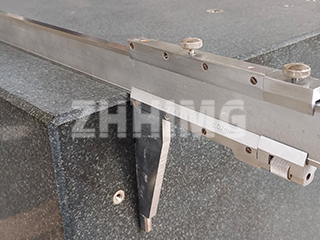Granite is widely recognized as an ideal material for the manufacture of precision measuring instruments due to its outstanding physical and chemical properties. Composed primarily of quartz, feldspar, hornblende, pyroxene, olivine, and biotite, granite is a type of silicate rock where silicon dioxide (SiO2) constitutes around 65% to 75%. Unlike marble, granite features a consistent pattern of small, uniform mineral grains, often with glimmering mica highlights and sparkling quartz crystals. Its fine-grained texture ensures that the structure is compact, durable, and stable, making it perfect for the production of high-precision granite measuring tools.
Granite’s Key Properties for Precision Tools:
-
Excellent Processing Capabilities:
-
Granite can be easily processed through various methods, including sawing, cutting, polishing, drilling, and engraving, allowing for the production of high-precision instruments. Processing accuracy can reach below 0.5μm, with surface polish reaching 1600 grit or higher.
-
-
High Density, Rigidity, and Hardness:
-
Granite’s high density and rigidity make it superior in terms of abrasion resistance, outperforming cast iron by 5-10 times. As a result, granite measuring tools maintain their high precision even after prolonged use.
-
-
Natural Aging and Structural Stability:
-
Granite undergoes long-term natural aging, which results in a uniform structure with minimal thermal expansion. This stability ensures that granite measuring instruments retain their accuracy even with fluctuations in ambient temperature. Its internal stress has dissipated, preventing deformation and ensuring high mechanical precision.
-
-
Superior Elastic Modulus:
-
Granite’s elastic modulus is higher than that of cast iron, enhancing its stability and reducing distortion under load, making it ideal for precise measurements.
-
-
High Compressive Strength and Vibration Dampening:
-
Granite has a high compressive strength and excellent vibration-damping capabilities, with an internal damping coefficient that is 15 times greater than that of steel. This makes granite perfect for precision measurement in environments prone to vibration.
-
-
Stable Physical Properties:
-
Granite tools are highly resistant to wear and damage. When damaged, the affected area will only experience local grain detachment without compromising the overall performance or accuracy of the tool.
-
-
Chemical Stability:
-
Granite’s chemical composition is highly stable and resistant to corrosion, making it capable of withstanding acidic and alkaline environments. Its silicon dioxide content contributes to its long lifespan, and high-quality granite measuring tools can last for more than 100 years.
-
-
Non-Conductive and Non-Magnetic:
-
Granite is non-conductive and non-magnetic, making it suitable for use in magnetically sensitive environments. Its stable surface allows for smooth movement during measurement without the occurrence of drag or friction, ensuring accurate readings.
-
-
Resistant to Moisture:
-
Granite is impervious to moisture, and unlike other materials, it does not rust when exposed to humidity. This property ensures that precision granite tools maintain their performance without the need for oiling or maintenance under normal working conditions.
-
-
Low Dust Adhesion and Easy Maintenance:
-
Granite’s smooth surface makes it resistant to dust adhesion, reducing the buildup of contaminants that can affect accuracy. It requires minimal maintenance and is highly durable, with a lifespan that can exceed a century.
-
-
Aesthetic and Decorative Qualities:
-
Besides its technical advantages, granite is aesthetically pleasing, with a fine texture and natural patterns. Its heavy texture and elegant appearance also make it an excellent choice for industries requiring both precision and visual appeal.
-
Why Choose Granite for Your Precision Tools?
-
Durability: Granite’s natural hardness, high rigidity, and resistance to wear make it the ideal material for precision measurement tools that need to withstand daily use in harsh industrial environments.
-
Precision: With its uniform structure and minimal thermal expansion, granite ensures that your measuring instruments maintain consistent accuracy even in fluctuating conditions.
-
Corrosion Resistance: Granite’s resistance to corrosion and environmental changes makes it the perfect choice for industries where chemical stability is a priority.
-
Low Maintenance: Granite measuring tools are easy to maintain and require minimal care to preserve their long-lasting performance and accuracy.
-
Aesthetics: Besides functionality, granite’s natural beauty and polished finish contribute to the visual appeal of precision tools, making them suitable for environments where both precision and aesthetic quality are valued.
Post time: Aug-18-2025

